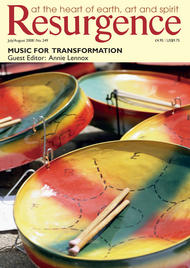CINEMA WAS A major shaping force on my young imagination. One film in particular which worked its magic was The Fisher King, a New York-set reimagining of the Grail quest. In that film, the most fascinating character is an antisocial, quixotic mystic who disrupts the life of another to get to the truth of things. I couldn’t stop thinking about this when reading Lewis Hyde’s new book, Trickster Makes This World. Like his previous book The Gift, this new title revels in the spirit of creativity. Hyde seems to be asking: Where are the opportunities for a kind of wild energy?
Trickster Makes This World explores the ways in which there are little ‘air-
pockets’ in which rules can be bent, maybe even broken, and in which we can subsequently let our sense of self breathe a little differently. In doing so, we energise the world.
At the heart of the book is Hyde’s ambition to “argue that the origins, liveliness, and durability of cultures require that there be space for figures whose function is to uncover and disrupt the very things that cultures are based on. I hope to give some sense of how this can be, how social life can depend on treating antisocial characters as part of the sacred.”
In The Gift, Hyde wrote about how to keep the spirit of generosity and creativity alive in a culture that perhaps doesn’t always seem to value either. Trickster complements that book with its analysis of the trickster mode. In effect, it offers a thrilling variation on a theme and it’s compelling to think about how one could apply something of what Hyde discusses to one’s own thinking and action.
Trickster moves across a wide range of narratives, myths, tribal stories and particular cultural figures, offering up a thrilling range of connections and reference points bracketed under sections with always fascinating titles such as ‘An Attack of Accidents’ and ‘The First Lie’.
Starting out with Native American tribal cultures and their emphasis on trickster figures, the book then moves out to classical mythology and Norse myth and then on to certain modern artists and public figures who have found ways to reimagine their place. Hyde develops his enquiry in order “to think more broadly about the kind of inventiveness that is figured in the mythology, the kind of art, in particular, that might spring from trickster’s spirit”.
Trickster Makes This World is built on a fascinating opening part entitled ‘Trap of Nature’, which defines the trickster concept and figure. This understanding is then used to anchor the ensuing, wide-ranging explorations on which Hyde takes us. The book works with ideas around shame, art and beauty, matters of gender and the value of accident and chance. Hyde brings into play the mythic figure of Hermes and also the very real former slave of 19th-century America, Frederick Douglass. These are utterly different characters yet are bound by a shared trickster sensibility which has “the ability to create or work with contingency”.
Trickster Makes This World, then, is a thoughtful celebration of myth and story that reminds us to always keep the door open and go with the flow. Like the equally attuned contemporary writer John Armstrong in his books Conditions of Love and Life, Love, Goethe, Hyde connects the specifics of a story, or the biographical detail of a life, and applies it easily to the more universal concern.
French film-maker Jean Renoir spoke of the need to always leave a door open on his film sets in case something occurred beyond that might usefully inspire the work being created. This openness to chance and the unexpected is what Hyde wants us to latch onto. With Trickster Makes This World, he has given us another guidebook and map to the landscape of our creative powers. Perhaps the quiet challenge now is to invest aspects of our lives with the fluid thinking of the trickster figure. Hyde tells us that the trickster has a mind that “can form an image or representation of some sort and ‘float it’…”
I imagine some readers will derive encouragement from this book. I hope so. I know I have. For someone like me who often frets too much about the done thing and gets caught in certain ‘traps’ of thought and action, Trickster Makes This World is a powerful reminder to stay seriously playful.
James Clarke teaches Film Studies at the University of Sussex and is currently working on two books about cinema.






